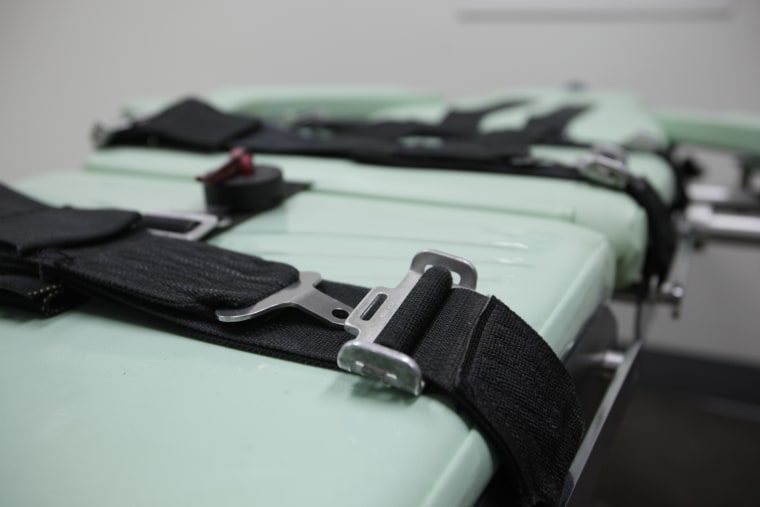LITTLE ROCK — All eight Arkansas death row inmates who were scheduled for execution within 10 days asked the U.S. Supreme Court on Wednesday afternoon to block the scheduled executions.
Three of the condemned men's dates with death had already been blocked by other court orders, but five others are scheduled to be killed by the end of April, starting Thursday night. A ninth death row inmate, whose death warrant has not yet been signed by the governor, also signed onto the petition.
The inmates' legal teams argue the controversial first drug in the state’s lethal injection cocktail could cause a "cruel and unusual" death.
Based on this argument, District Judge Kristine Baker ordered a blanket injunction to stop all of the executions last Saturday. The Arkansas Attorney General’s office almost immediately appealed the ruling to the U.S. Court of Appeals for the 8th Circuit, however, and that court overturned the ruling on Monday — mere hours before two executions were scheduled.
Those two men’s death sentences still did not proceed, blocked by a separate court appeal, but there are still five men slated to be put to death starting Wednesday. The five executions over eight days would match a sepulchral speed record set by Texas in 1997 and 2000.
The appeal to the country’s highest court seeks to reinstate Baker's blanket injunction, stating that the two days the 8th Circuit took to deliberate over the Easter weekend meant that they likely rushed to judgment.
In contrast, the district court held a four-day hearing that included 90 exhibits of more than 2,000 pages and 17 witnesses who provided 1,300 pages of transcribed testimony. Two days, therefore, could not have been nearly enough time for the 8th Circuit to decide, the defense said.
Related: Arkansas Executions: What’s Next for the State’s Push to Execute a Record Number of Inmates
“[The inmates] ask not for delay but rather for vindication of meritorious claims that will prevent their cruel and unusual executions,” the defense wrote to the country’s highest court.
The defense argued that a firing squad would be a more humane and less painful execution — although that is not currently an option under Arkansas law.

The state instead uses lethal injection, in a three-drug process which begins with a sedative named midazolam — the crux of the Arkansas debate.
The inmates' legal teams, as many death penalty opponents have argued, fear that midazolam does not render the inmates unconscious — its main purpose in an execution.
That means that death row inmates could seem unresponsive but actually feel like they’re suffocating after the second drug, a paralytic, is introduced.
The final drug, potassium chloride, stops their heart, and is described as feeling like a hot poker being driven through the inmate's veins if they are conscious.
Arkansas' store of midazolam is set to expire at the end of April, one of the reasons for the rushed schedule of executions. A favorable Supreme Court ruling would likely cancel these men’s death sentence for the foreseeable future because the state would not have any more of the drug that could be used after April 30.
Related: After Arkansas Execution Blocked, Victim’s Daughter Still Wants Justice
Arkansas is hard up for lethal injection drugs because pharmaceutical companies have long avoided providing their products to Department of Corrections for executions. A separate case in Arkansas filed Tuesday illustrates the state’s problem.
McKesson Medical-Surgical — a pharmaceutical supply company — claims that the Arkansas Department of Corrections duped them into providing 100 vials of the second drug in the lethal injection protocol, vecuronium bromide, believing they were providing it for medicinal reasons.
McKesson convinced a judge to place a temporary restraining order on the drug, but the company had its case dismissed after Baker blocked the executions.
After that ruling was overturned, McKesson filed a new complaint on Tuesday to stop the Arkansas Department of Corrections from using the drugs, which would essentially block the remaining executions.
"McKesson is committed to ensuring that its property is only used in a manner consistent with our supplier agreement," a company statement said.
The Arkansas Attorney General’s office filed a motion to dismiss McKesson’s case on Wednesday and asked for a change of venue because of a Pulaski County judge’s anti-death penalty activism.

